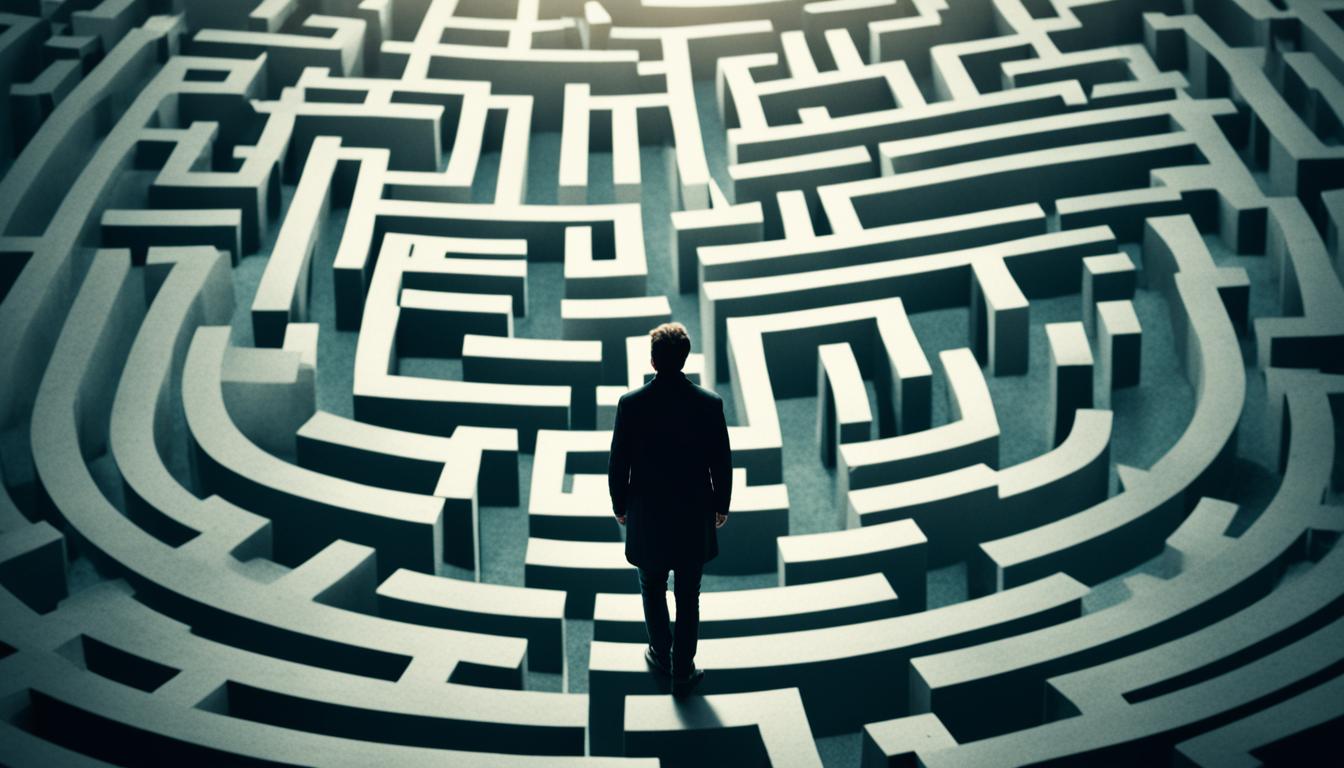Feeling lost and unsure of what path to take in life is a common experience that many of us face. The overwhelming confusion and uncertainty can leave us feeling stuck and in need of guidance. But fear not, for Buddhism offers profound wisdom that can help us navigate the complexities of decision-making and find the clarity we seek.
Buddhism teaches us to embrace mindfulness and compassion, allowing us to cultivate a deeper understanding of ourselves and the world around us. By incorporating these teachings into our lives, we can untangle the web of confusion and make choices that align with our true selves.
In the words of the Buddha, “Don’t be afraid of the unknown. Instead, step into it with an open heart and a curious mind. Embrace the journey of self-discovery and trust that clarity will arise.”
Key Takeaways:
- Feeling lost and uncertain is a common experience in life.
- Buddhism provides valuable insights and teachings on mindfulness and compassion.
- Slowing down and observing our thoughts can lead to mental clarity.
- Challenging limiting beliefs and trusting ourselves is essential for decision-making.
- Recognizing the signs of feeling lost helps us address them effectively.
Slow Down for Mental Clarity
Slowing down is essential to achieving mental clarity. In today’s fast-paced world, we often find ourselves rushing through life, making decisions hastily without taking the time to consider the consequences. By embracing a slower pace and allowing ourselves moments of contemplation, we create space for clarity to emerge.
When we slow down, we give ourselves the opportunity to reflect on our thoughts, emotions, and desires. This intentional pause allows us to sort through the noise and confusion that often cloud our minds. It’s during these moments of stillness that our truest selves can shine through, guiding us towards clarity and purpose.
One effective way to slow down and cultivate mental clarity is to set aside dedicated time for analysis and reflection. This can take the form of a retreat or even a sabbatical, where you remove yourself from the distractions and obligations of daily life. During this time, you can engage in activities that promote introspection, such as journaling, meditating, or simply spending time in nature.

It’s important to note that the amount of time needed to gain mental clarity may vary depending on the complexity of the decision at hand. While a few hours or a day may be sufficient for minor choices, more significant life decisions may require a week-long retreat or even an extended period of introspection.
By slowing down and taking the time for contemplation, we honor the importance of our decisions and allow ourselves to fully explore the possibilities. We free ourselves from the pressures of immediacy and create an environment that fosters mental clarity and confidence.
The Benefits of Slowing Down:
- Enhanced self-awareness and self-reflection
- Reduced stress and anxiety
- Improved decision-making skills
- Increased creativity and innovation
- Deeper understanding of personal values and goals
Incorporating moments of slowness and contemplation into our lives is not always easy, but the rewards are invaluable. By prioritizing mental clarity, we gain the clarity and insight needed to navigate life’s challenges with confidence and purpose.
| Ways to Slow Down and Cultivate Mental Clarity | Benefits |
|---|---|
| Take regular breaks throughout the day to pause and reflect | Enhanced focus and productivity |
| Practice mindfulness and meditation | Reduced stress and improved emotional well-being |
| Engage in activities that bring you joy and relaxation | Improved overall happiness and life satisfaction |
| Disconnect from technology and spend time in nature | Restored mental energy and heightened sense of connectedness |
Be an Observer
Observing your thoughts without judgment is a powerful practice that can lead to mental clarity. Our minds are often filled with a constant stream of thoughts that contribute to confusion and overwhelm. By cultivating mindfulness and practicing meditation, you can develop the ability to observe your thoughts and emotions without becoming absorbed in them.
Mindfulness allows you to become aware of the patterns and underlying causes of your confusion. It is a state of non-judgmental awareness in which you simply observe your thoughts and experiences as they arise. By accepting your present mindset and letting go of your inner critic, you can cut through the mental haze and gain a deeper understanding of your true mental and emotional states.

Meditation is a powerful tool that can help you develop self-awareness and cultivate a sense of calm and clarity. By taking the time to quiet your mind and focus on the present moment, you can train your brain to stay grounded and centered, even in the midst of confusion. Through meditation, you can develop the ability to observe your thoughts without getting carried away by them.
When you observe your thoughts with mindfulness and meditation, you create space for clarity to emerge. You become more attuned to your inner self and gain insight into the causes of your confusion. This self-awareness allows you to make decisions from a place of clarity and authenticity, rather than being driven by fear or external influences.
Trust Yourself, Not Your Confusion
Realizing that you are not your thoughts is a powerful step towards gaining mental clarity. It’s easy to mistake confusion for a lack of knowledge or ability, but in reality, confusion often stems from limiting beliefs, fears, and assumptions that we have internalized over time.
By challenging these beliefs and questioning their validity, we can break free from the thoughts that hold us back. It’s time to let go of self-doubt and the stories that limit us. You have the power to trust yourself and make decisions with confidence.
Give yourself permission to challenge the beliefs that tell you that you can’t or shouldn’t. Embrace the fact that you are capable of so much more than you may realize. By trusting yourself and embracing your true potential, you can overcome confusion and achieve the clarity you seek.

Breaking Free from Limiting Stories
Our minds are often filled with stories that hold us back, stories that tell us we’re not good enough or that we don’t deserve success. These stories may have been ingrained in us since childhood or may have been shaped by past experiences.
It’s time to challenge these limiting stories and rewrite them with empowering narratives. Start by identifying the beliefs that are holding you back. Are you telling yourself that you’re not capable or that you’ll fail? Challenge these beliefs by gathering evidence to the contrary.
Perhaps you’ve accomplished things in the past that prove your abilities. Write down your achievements and remind yourself of them whenever self-doubt creeps in. Replace the limiting stories with affirmations that reinforce your strengths and potential.
Embracing Your Inner Wisdom
Deep within you lies a wellspring of wisdom and intuition that can guide you towards clarity. Trusting yourself means tapping into this inner wisdom and listening to your intuition.
Practice quieting your mind through meditation or other mindfulness techniques. Create space for your inner voice to be heard. In this stillness, you’ll find the answers you seek and the clarity you crave.
Remember, you have the power to trust yourself. Challenge the beliefs that hold you back, let go of self-doubt, and embrace your inner wisdom. It’s time to step into your true potential and make decisions with confidence.
Recognizing the Signs of Feeling Lost
When you’re feeling lost, it’s important to recognize the signs and understand the root causes of your confusion. By identifying these signs, you can take steps towards finding clarity and direction in your life.
Here are some common signs of feeling lost:
- A lack of purpose or direction
- A lack of passion or drive
- Feeling unmotivated
- Being unclear about your values and beliefs
- Experiencing self-doubt
- Feeling overwhelmed
- A lack of control over your life
These signs can manifest in different ways for each individual. You may find yourself questioning your purpose in life, lacking the motivation to pursue your goals, or feeling uncertain about your values and beliefs.
When you experience self-doubt and a lack of control, it can be challenging to make decisions and take action towards finding clarity. The feeling of being overwhelmed can further contribute to your confusion.
Image:
Recognizing these signs is the first step towards finding clarity and direction. It allows you to acknowledge your current state and begin the process of self-reflection and growth.
Next, we will explore strategies to address these signs of feeling lost and regain a sense of purpose and control in your life.
Finding Clarity and Direction in Life
Feeling lost is not uncommon, and it can be caused by various reasons. Sometimes, we lack clarity on our personal values, interests, and goals, making it difficult to find direction. The fear of making the wrong choice or uncertainty about the future can also contribute to this feeling. Balancing others’ expectations with our own desires can create confusion and lead us astray. Limited exposure to new experiences and opportunities can further exacerbate our uncertainty. Additionally, a lack of self-awareness and self-reflection, constant comparison to others, feelings of inadequacy, unresolved past traumas, and societal pressures to conform can all play a role in feeling lost.
So, how can we navigate this journey towards finding clarity and direction in our lives? Self-reflection is a powerful tool that allows us to explore our thoughts, emotions, and experiences on a deeper level. By taking the time to reflect, we can gain insights into our true desires and passions, helping us align our choices with our values. It’s essential to engage in regular self-care practices, such as mindfulness, meditation, and journaling, to foster self-awareness and cultivate a sense of inner peace. These practices can guide us in making decisions that are true to ourselves, rather than those influenced by external pressures.
While self-reflection and self-care are valuable, seeking professional help can provide additional guidance and support. A trained therapist or counselor can provide a safe space to explore our feelings, offer new perspectives, and help us develop strategies to overcome our confusion. They can assist in identifying patterns, uncovering underlying issues, and developing a plan of action to move forward.
In addition to professional help, finding guidance and mentorship from those who have walked a similar path can be immensely beneficial. Seeking out individuals who have achieved clarity and direction in their lives can inspire and provide valuable insights. Mentors can offer guidance, share their experiences, and challenge our limiting beliefs. Their wisdom and support can pave the way for our own personal growth and development.
| Reasons for Feeling Lost | |
|---|---|
| Lack of clarity on personal values, interests, and goals | |
| Fear of making the wrong choice | |
| Uncertainty about the future | |
| Difficulty balancing others’ expectations with one’s own desires | |
| Limited exposure to new experiences and opportunities | |
| Lack of self-awareness and self-reflection | |
| Comparison to others | |
| Feelings of inadequacy | |
| Unresolved past traumas | |
| Social and cultural pressure to conform |
By engaging in self-reflection, practicing self-care, seeking professional help, and finding guidance and mentorship, we can navigate the journey towards finding clarity and direction in our lives. Remember, this is a transformative process that takes time and effort, but the rewards of living a purposeful and fulfilling life are immeasurable.

Conclusion
In conclusion, finding clarity and direction when you feel lost is a transformative journey that requires self-reflection, self-care, and seeking guidance. By slowing down and taking the time to observe your thoughts, you can begin to untangle the confusion and make empowered decisions. Challenging limiting beliefs and recognizing the signs of feeling lost are crucial steps to overcoming confusion and finding your path.
It’s important to remember that this process takes time and effort. There is no quick fix or one-size-fits-all solution. However, by committing to these steps towards clarity, you can pave the way for a courageous and fulfilling life. Trust in yourself and your abilities, and don’t be afraid to seek support and guidance from others along the way.
By finding clarity and direction, you have the power to live a life aligned with your values, passions, and goals. Embrace the journey, embrace the challenges, and embrace your own capability to make empowered decisions. Believe in yourself and your ability to navigate through confusion, and you will discover a life filled with purpose and courage.
FAQ
What can I do when I don’t know what to do and feel lost?
Feeling lost and unsure of what path to take in life is a common experience. There are strategies and techniques that can help you find clarity and direction. By exploring the impact of Buddhism and implementing its principles, you can navigate the confusion and uncertainty and make decisions with greater clarity.
How do I gain mental clarity?
Slowing down is the first step towards gaining mental clarity. By taking a step back and giving yourself the space to reflect, you can sort through the confusion and chaos in your mind. Observing your thoughts without judgment through mindfulness and meditation is also crucial for gaining mental clarity. Realizing that you are not your thoughts and challenging limiting beliefs will help you untether yourself from the thoughts that hold you back.
What are the signs of feeling lost?
Signs of feeling lost include a lack of purpose or direction, a lack of passion or drive, feeling unmotivated, being unclear about values and beliefs, experiencing self-doubt, feeling overwhelmed, and a lack of control over your life.
Why do I feel lost?
Feeling lost can stem from various reasons, including a lack of clarity on personal values, interests, and goals, fear of making the wrong choice, uncertainty about the future, difficulty balancing others’ expectations with your own desires, limited exposure to new experiences and opportunities, lack of self-awareness and self-reflection, comparison to others, feelings of inadequacy, unresolved past traumas, and social and cultural pressure to conform.
How can I find clarity and direction in life?
Finding clarity and direction when you feel lost is a transformative process that requires self-reflection, self-care, and seeking guidance. By slowing down, observing your thoughts, challenging limiting beliefs, and recognizing the signs of feeling lost, you can overcome confusion and make empowered decisions. Engaging in self-reflection, practicing self-care, seeking professional help, and finding guidance and mentorship can all help you navigate the journey towards finding clarity and direction in your life.
What should I do to overcome confusion and make empowered decisions?
By following the strategies mentioned earlier, you can overcome confusion and make empowered decisions. It’s important to remember that finding your unique path in life is a journey that may take time and effort. However, by taking these steps towards clarity, you can live a more courageous and fulfilling life.

